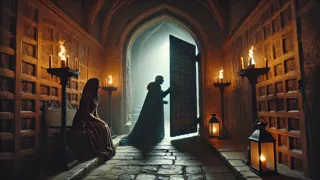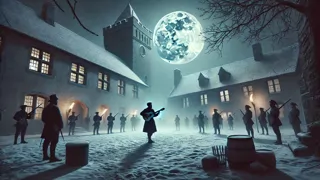Introduction
Long before the tangle of modern highways and the clang of steel rails, there stood a fortress of rough-hewn stone in the northern reaches of medieval Rus’. Its battlements overlooked a frozen river that wound through birch forests and snow-laden pines. Legends whisper that the river itself carried voices of ancient spirits, and on moonlit nights, the wind carried faint echoes of songs long since passed. Within the grey walls lived King Mikhail, newly crowned and beloved by his people for his gentle wisdom and tender heart. Yet dark ambition stalked the land. A rival warlord rose in the east, clashing armies beneath crimson banners and forging secret pacts with merciless generals. When his spies infiltrated the palace and a traitor opened the gates under cover of night, King Mikhail was captured before dawn. With his crown torn from his brow, the rightful monarch was thrown into a damp, subterranean cell where torches flickered like distant stars and the walls bore stains of old blood. The warlord declared the king a traitor to the realm, decreed a hunger-strike execution, and raised his black flag over the castle.\n\nThe people of the kingdom fell into despair. Noble knights and seasoned soldiers rallied at the borders, but they lacked unity. Their hearts ached for hope, and prayers rose from every chapel and hearth. Amid the gloom, one soul dared to resist the tide of fear: Princess Anya, the king’s devoted wife. Known throughout the palace for her compassionate counsel and quiet strength, Anya refused to bow before tyranny. Yet the castle gate was sealed, the roads patrolled by armed men, and the prison lay deep beneath thick iron. She needed a plan as cunning as it was gentle—a plan born of art, not steel. So she did what none expected: she picked up her cherished lute and donned the guise of a wandering minstrel. Clad in a weathered cloak and simple tunic, with a lute strapped across her back, she took to the frozen road under cover of dusk, carrying with her only a handful of provisions and an unwavering faith that the power of music and love could pierce the darkest chains.
I. A Minstrel’s Journey into Darkness
The path from the palace to the dungeon lay cloaked in winter’s hush. Princess Anya moved with quiet resolve across the frozen moat, her heart thrumming like the strings of her lute. Each footfall on the snow was a prayer. She had studied the guards’ rotations, learned the wardens’ habits, and discovered that at midnight their vigilance dimmed as the cold lulled their senses. With a soft cloak drawn over her shoulders and the hood shadowing her face, she approached the gatehouse, her instrument concealed beneath layers of wool and leather. Beyond the gate, the prison carved into the earth yawned like a wound. Heavy iron doors barred the way, engraved with the warlord’s sigil—a rampant wolf. A single torch sputtered in its bracket, offering weak illumination against the black granite walls. Slipping inside, Anya felt the wind of stale air and heard the drip of distant water echo through the vaults. She paused at the first guard post, heart pounding. It was time. Drawing her lute out from its hiding place, she lifted it to her chin and began to play.\n\nHer fingers moved with grace, coaxing a haunting melody that wove through the torchlit corridors. The tune was one she had composed years before—a lullaby her husband loved as a boy. Its notes carried not only in the air but in the hearts of those who listened. The guard’s hand drifted to his sword, but he stopped, transfixed by the beauty of the music. Slow tears traced lines down his frost-chapped cheeks. Through the labyrinthine passages, other guards emerged, drawn away from their posts as Anya’s song whispered freedom into their ears. Their firm discipline dissolved in the face of her art. Like moths to a flame, they left their torches and keys behind, following the melody until they reached an iron portcullis deeper in the dungeon. Anya paused, plucking a soft cadence that told of longing and love and hope. Then, unseen, she slipped past the guards who wept silently, broken by beauty.

II. The King’s Rescue Amid Frozen Stones
By the time Anya reached the final cell, the old keys clattered to the stone floor, abandoned by those who had fallen under the spell of her melody. She paused before the barred door, her breath rising in misty clouds. Beyond, King Mikhail sat on a narrow cot, his robes torn and shoulders slumped, but his eyes brightened at the sight of his wife. His voice was hoarse from cold and despair, yet he managed a weak smile. Anya raised her lute once more, and the notes danced with renewed warmth. She wove a tune that spoke of dawn’s first light and the promise of spring, of melting ice and returning life. As her melody swelled, the iron bars trembled, the walls echoed with ancient power, and a hush fell over the dungeon. In that moment, Anya believed her music held a magic older than the warlord’s armies—a magic born of devotion. She reached through the bars to her husband, and together they pressed against the iron gate. With a final chord that rang like a clarion call, the lock snapped open, and the door swung wide. They hurried down the corridor, Anya guiding her weakened king past the torchlit cells, past the silent guardians who remained entranced. Every step battered their resolve as much as the icy wind and the weight of her husband’s exhaustion. Yet the melody still trailed behind them like a guardian spirit, keeping watch over their flight.

III. The Song That Shattered Tyranny
They emerged into the courtyard just as the moon reached its zenith, brushing the snow with silver light. Outside, the warlord’s banner still flew above the gate—black as grief, its wolf snarling at the sky. Soldiers patrolled the battlements, their eyes scanning the darkness. But Anya had one final note to play. She strode into the open, her husband leaning on her shoulder, and lifted her lute for the last time. Over the frozen moat, her melody soared, blending the lullaby of childhood with the triumphant strains of a royal march. The walls quivered, the wind stilled, and every blade of grass, every stone, every frost-laden branch seemed to listen. The warlord’s soldiers halted mid-step, their faces turned upward, hearts caught in the beauty of Anya’s song. In that enchanted moment, they were neither conquerors nor captives but fellow souls united by music’s grace. Even the warlord himself—clad in spiked armor and velvet cloak—felt the steel at his throat loosen as the final chord quivered in the frosty air. He staggered from the battlement, eyes wide as realization broke upon him: the king had returned, and his rule was undone by a humble tune. The banner slid from its pole, the soldiers dropped their weapons, and the fortress fell silent as dawn’s first light painted the sky. Anya lowered the lute at last, and the courtyard filled with gentle applause. King Mikhail embraced her, and together they reclaimed the throne, not by blade but by the unbreakable notes of her devotion.

Conclusion
As dawn warmed the spires of the reclaimed fortress and the first birds ventured into the sky, Princess Anya and King Mikhail stood before their people on the castle steps. The silver notes of her lute seemed to linger on every breeze, a testament to the triumph of gentle courage over steel. Banners of peace unfurled where once black flags had flown, and the people cheered not only for their returned monarchs but for the power of love itself. In the years that followed, the tale of the lute player spread across Rus’, passed from mother to daughter, bard to traveler, growing in wonder with each telling. They spoke of how a single melody, born in the heart of a faithful wife, had toppled tyranny and rekindled hope in an age of darkness. Songs were composed, children learned the princess’s lullaby, and minstrels carried the legend far beyond the frozen rivers and birch forests. Through generations, the story endured as a reminder that sometimes the gentlest voice can challenge the fiercest chain, and that courage wears no crown—only conviction. And so the melody lives on, echoing through history as proof that love’s harmony conquers even the hardest prison.


















